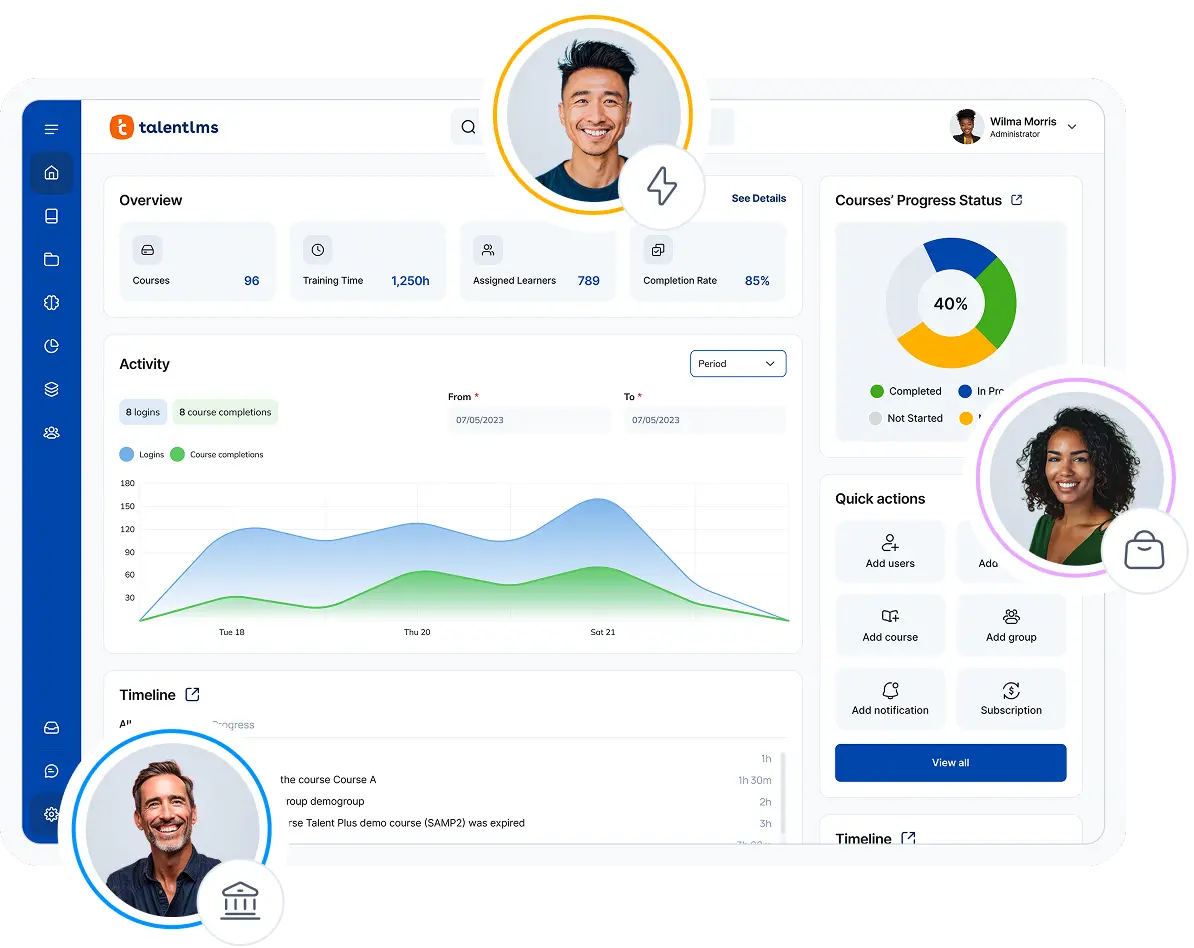For businesses with effective leaders, success usually follows naturally. But the skills associated with effective leadership don’t automatically come with the title. They take time, effort, and training to perfect.
Rooted in broad capabilities rather than practical knowledge, leaders have a wide and demanding remit. And they need the skillset to match. For L&D teams, the challenge is knowing what specific leadership training topics to focus your training budget on.
To help, we’ve compiled our top 20 list of leadership training topics. Plus, some practical tips on delivery methods to make leadership training more effective, too. Let’s start, though, with a quick dip into what makes a commitment to leadership training such a good investment.
- Leadership training topics: Core soft skills
- Leadership training topics: Building high-performing teams
- Leadership training topics: Supporting a strategic outlook
- Leadership training topics: Change management
- Leadership training topics: Communicating with impact
- Leadership training topics: Optimizing a growth mindset
- Leadership training topics: Digital technologies
Why is leadership training important?
When we asked employees to rank the soft skills they’d like to get training on, leadership came top. Why is it so highly regarded? Leadership training symbolizes empowerment for employees. It equips them with the skills and knowledge to excel in their role, grow professionally, and help others grow, too. In short, it gives individuals the confidence and capabilities to take on new challenges and responsibilities and thrive.
For businesses, leadership training represents organizational stability, more engaged, efficient and productive teams, and better business outcomes. Plus, because leadership training makes employees feel invested in and valued, it also leads to higher levels of employee retention. And a more positive organizational culture.
It’s a common misconception that leaders are born not made. It’s a very rigid and outdated way to view individuals. Plus, it actively prevents employees from exploring new paths or skill sets and companies from tapping into hidden talent. And that’s what we discuss with Neena Newberry, trailblazing former Deloitte Exec and Leadership Coach, on our podcast episode “What most leaders get wrong—and how to do it right“.
20 leadership development training topics
But what do we mean by “leadership training topics”? This catch-all phrase disguises the complexity that lies beneath. And could explain why leadership training often falls short of the mark with 38% of new leaders failing within the first 18 months in post.
To reap the benefits of leadership training, the generic concept needs to be broken down into specific skills. So, what leadership training topics should a leadership training program include?
Here’s our list.
Leadership training topics: Core soft skills for effective leadership
According to employees in the software industry, soft skills training for leadership is one of the biggest contributors to a healthier culture. The following leadership training topics are important for leaders in all industries and at all levels.
1. Accountability
Leaders who can see and admit to their faults are one step closer to gaining the trust and respect of their team. But acknowledging accountability doesn’t come easy—particularly for new leaders trying to demonstrate credibility and respect without any existing provenance.
Including accountability in your team leader training helps reinforce the essential skills of transparency, self-reflection, and honesty. And that impacts the entire organization, fostering a culture of openness, trust, and respect. Accountability training promotes a growth mindset approach. It’s also one of the best ways to improve workplace performance because it improves relationships and boosts motivation.
2. Authenticity
Can you train someone how to be authentic? Well, you can, and you should. When leaders bring their true selves into the workplace, the message is loud and clear: it’s good to be yourself because your voice matters. But there’s another aspect, too. Authentic leaders inspire others by being genuine while maintaining professionalism. Training on authenticity encourages leaders to build honest, trustworthy relationships while respecting workplace boundaries.
3. Confidence
Confidence is often considered a personality trait. But self-belief and assertiveness are skills that can and should be taught as part of leadership training. When balanced with humility, confidence allows leaders to make decisive choices and inspire their teams. Team members are also more likely to trust a confident leader and be more assertive themselves.
4. Emotional intelligence (EQ)
Emotional intelligence (EQ) is the ability to read and manage emotions and cultural differences. Leaders with high EQ navigate interpersonal dynamics more effectively, building stronger relationships and fostering a positive work environment. Even more, leaders who not only understand but also proactively use EQ to understand and support cultural differences build more creative teams. Training in EQ often includes self-awareness, empathy, stress management, and self-regulation.
5. Ethics and responsibility
Ethical decision-making ensures leaders act with integrity, promote sustainability and social responsibility. and prioritize organizational values. Ethics training covers frameworks for ethical choices, stakeholder considerations, and maintaining transparency.
6. Humility
Humility complements confidence by preventing it from becoming arrogance. It promotes a collaborative workplace culture because modest leaders are considerate of other people’s needs. By including humility in your team leader training program, you step away from an outdated approach that presents the team manager as the “boss” and team members as the “subordinates”. Leaders who embrace humility can truly make a difference in the workplace. They improve employee relationships, give everyone on the team a voice, and elevate group performance and success.
7. Inspiring others
Part of being a leader is taking others on a journey with you. Training in motivation and inspiration provides leaders with tools and tactics to connect with teams and promote a shared purpose. By selling a compelling vision, inspirational leaders can then go on to drive engagement and productivity.
Leadership training topics: Building high-performing teams
High-performing individuals are an asset to any organization. But they don’t provide the same level of resilience, sustainability, and impact as high-performing teams. Which is why leadership training needs to encompass skills associated with team building. Create and sustain cohesive, motivated teams by making the following part of your training topics for leaders.
8. Conflict management
No team runs smoothly all the time. Having the skills to know how and when to intervene in potentially explosive situations is a key part of leadership training. As is knowing how to turn conflicts into opportunities for growth. With the right conflict management training, your leaders will learn not only to resolve disputes but turn them into productive outcomes.
9. Delegation
Delegation involves assigning tasks based on individual strengths, promoting accountability and empowering team members. A powerful way of building robust teams, effective delegation skills can boost employee well-being, morale, and productivity.
10. Diversity & inclusion
D&I training fosters an inclusive workplace culture, essential for creative, collaborative and high-functioning teams. Leaders with D&I awareness and aptitude learn to recognize unconscious biases, create inclusive policies, and champion equity across the workplace.
Leadership training topics: Strategic outlook
Being able to think (and then act) “for the business” is an important art for leaders to master. But it’s not always easy – especially during times of change, stress, or uncertainty. Strategic thinking training helps leaders acquire a business-first mindset that supports organizational goals. Which results in long-term benefits for employees and employers. Sub-topics include:
11. Decision-making
Decision-making training equips leaders with frameworks and techniques to make informed, timely choices. Leaders learn to gather relevant information, weigh risks, think critically, and act with judgment. All of which eliminates uncertainty, improves team morale, and leads to better team outcomes, and a more positive organizational impact.

12. Problem-solving
Problem-solving training develops a leader’s ability to identify and address roadblocks proactively. By learning how to approach challenges methodically, they can reach effective solutions faster. And foster an environment where creative solutions are valued and implemented.
Leadership training topics: Change management
In today’s fast-paced world, workplaces don’t stay the same for long. Leaders need to learn a portfolio of skills to help them navigate transitions smoothly and foster resilience within their teams. Topics for leadership training associated with change management should include the following skills:
13. Agility
Agility training enables leaders to pivot in response to market changes or organizational shifts. Leaders learn to embrace flexibility and adaptability, crucial for thriving in unpredictable conditions.
14. Resilience
When the going gets tough, effective leaders keep positive and keep going. By focusing on stress-relief techniques and other tactics, resilience training helps leaders handle pressure and setbacks constructively. And maintain a balanced, optimistic outlook as well as a healthy working environment.
Leadership training topics: Communicating with impact
According to employees, lack of transparency and communication from management and leadership teams is one of the top 3 contributors to the toxic work culture in their companies. A toxic work culture is bad news for businesses and employees. But it’s just one reason why effective communication is such an important skill for leaders to have. Clear, inspirational, and empathetic communication fosters trust, aligns team goals, supports conflict resolution and team performance, and promotes efficiencies. Bringing this down to a granular level, focus communication skills training on the following:
15. Active listening
Active listening is at the heart of many other core leadership skills. For example, problem solving, creativity, EQ, decision making, and conflict management. Using active listening techniques leaders are better able to understand others’ perspectives and concerns. And by doing so, see the bigger picture, build trust, and boost credibility. It also helps leaders make better decisions for employees, teams, and businesses in general.
16. Public speaking
To engage and inspire a live audience, leaders need to draw on a wide range of skills. Public speaking skills training helps leaders build confidence, project authority, craft a compelling message and create a lasting impression.
Leadership training topics: Optimizing a growth mindset
Continuous learning keeps effective leaders, effective. Leadership development also promotes a wider culture of professional development across teams and organizations. To support a growth mindset in the workplace, provide leadership training topics that cover the following growth mindset examples:
17. Coaching and mentorship
From knowledge-sharing to guided questions and active listening, leaders with a grounding in coaching and mentorship can empower employees to reach their potential.
18. Feedback and reflection
Self-reflection techniques, combined with a commitment to seeking and using feedback, help leaders identify strengths and areas for improvement. Invaluable for personal growth, leaders trained in these topics can also use these skills to help others too.
Leadership training topics: Digital technologies
Digital skills will be important in a new workplace shaped by AI and automation, 65% of surveyed HR managers think. Yet, only 24% of leadership development professionals currently use AI. This changing landscape has added a new leadership training topic to the mix. And a new cluster of in-demand skills to an otherwise traditional list of leadership training topics. Areas to focus on to support employees in leadership roles include:
19. Using AI tools
Proficiency in using AI tools is expected to unlock tremendous possibilities in lifting productivity and efficiency, driving innovation, refining the decision-making process, and much more. Leaders need a basic understanding and knowledge of AI tools to support this and optimize use across teams. Training in this should cover a wide spectrum of use cases, including navigation of AI-powered systems, familiarity with AI interfaces, and the use of game-changing, generative AI.
20. Digital literacy and enablement
Digital literacy and digital enablement are intertwined but distinct, each contributing to a different aspect of digital transformation.
Digital literacy involves manipulating computerized information and digital use tools, platforms, and systems.
Digital enablement is about choosing the right technology so that a system, device, platform, or tool serves its purpose. It’s also about creating a productive work environment where digital transformation can flourish. Both digital literacy and enablement will be powerhouse abilities in the AI-infused future, supporting digital-first strategies and AI adoption. And are important areas of training for leaders, now and in the future.
How to support leadership training
Knowing how to deliver effective leadership training is just as important as knowing what leadership training topics to focus on. Here are four ways to approach the delivery of training for leadership skills:
Identify training/knowledge gaps
Using employee training software, you can track training and compare leadership development gaps with your list of leadership training topics. Look at elements like assessment scores and completion rates to identify leaders who may need additional support. A skills gap analysis template can be used to dig deeper and determine specific areas where leaders need additional development. Identifying knowledge gaps can help pinpoint what leadership training topics to focus on. And it ensures that training programs are personalized and relevant, targeting areas where leaders can grow most effectively.
Provide formal training courses
Formal training can include pre-made or custom-built courses that address specific leadership skills, such as conflict resolution or emotional intelligence. Structured programs based around key cornerstone leadership training topics provide leaders with foundational knowledge, enhancing their confidence and performance in real-world applications.
Explore informal methods
Reinforce structured training and boost retention with informal learning methods—such as mentorship, coaching, and online discussion forums. Informal methods encourage leaders to learn from their peers and mentors, promoting a collaborative learning environment. And providing leaders with practical insights and guidance.
Use AI-powered tools
Create personalized training experiences for leaders using AI. By analyzing individual learning preferences and performance, AI-driven platforms can provide leaders with customized content based on leadership training topics, adaptive learning paths, and real-time feedback.
Make leadership training more accessible
Not all leaders have a formal leadership title or role. As Newberry puts it “[…] companies also make the mistake of focusing on giving leadership development to people who need it the least.” This is usually when a company only invests in high performers or people with high potential. Whereas that may not always be needed. She adds, “While there are other people who need that level of investment, who may be what you would call diamonds in the rough. So if they got some level of investment in them, they could really do well.”
Nurture future leaders as well as the leaders of today by creating separate leadership training programs. For example, leadership training topics for employees and leadership training topics for managers.
Apply the learning
Giving your leaders access to learning content and training sessions is great. But making learning a one-off occurence cannot possibly solidify the knowledge and make it practical for leaders. As Newberry states, “[…] the reality is that you have to be able to apply the learning. Learning comes from doing. So you need exposure. You need exposure to content as well as the opportunity to practice because I mean, even think about it in sports, think about all the practices you have, right?”
So, you need to ensure that your training efforts are not only useful, but also practical. That’s how you’ll provide true value and impact.
Leadership development: The same but different
When Forbes compared its latest Leadership Development Benchmarking Report with previous surveys, it found that many of the most in-demand skills hadn’t changed. Cross-referencing this with the list we’ve just shared, there’s obvious truth in this. Leadership training encompasses a wide range of “classic” leadership topics that are as relevant today as they were years ago. But that’s not the whole picture. Technology is slowly but steadily shifting the narrative.
From mastering AI tools to adapting communication methods to meet the needs of increasingly dispersed and remote teams, the skills leaders need to stay effective are widening. This doesn’t mean that classic skills associated with traditional leadership training courses will become redundant. Far from it. Leadership today is still deeply rooted in soft skills—interpersonal abilities that build trust, foster engagement, and support team cohesion. And this human touch will take on even greater significance into the future, as digital technology picks up the heavy lifting elsewhere.
As Newberry puts it, “[…] our focus is more around building capabilities versus just focusing on discrete skills, because at the end of the day, that’s what really translates into the impact.”
The key to success is to focus leadership topics on a blend of soft skills, strategic thinking, digital capabilities, and an authentic leadership style. The result? Current and future leaders who can balance the benefits of technology while still inspiring, guiding, and elevating their teams.
| Tags: Employee Training,leadership






